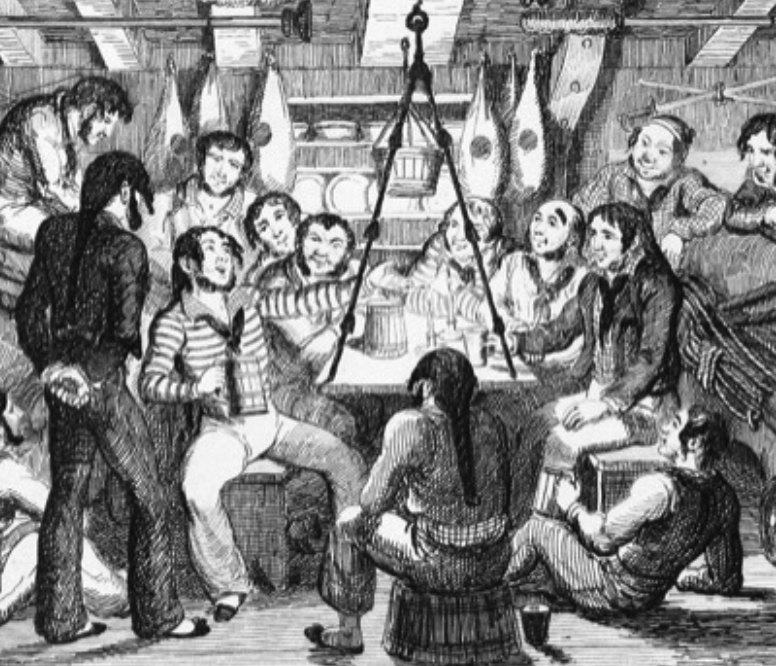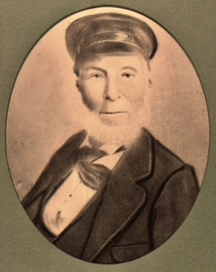Maori
songs - Kiwi songs - Home
Leebrick and Colquhoun pushed "the Folk Process" to its limits,and claimed
seven songs as "the oldest English-language New Zealand songs."
In fact, "The Bold and Saucy China" is one of the oldest.
Neil ColquhounThe
collecting work of Neil Colquhoun (b.1929 - d.2014) was spread
over a number of years, and he used a number of methods. But
unlike Rona Bailey, he did not conduct dedicated field trips
or do archival researching. Blood Red Roses Come All You Tonguers
David Lowston New Zealand Whales Whaling Off Greenland Shore Cry The first five of these songs, plus "Across the Line" were recorded in 1959 by "The Song Spinners," a group led by Colquhoun, as Songs of the Whalers. The National Library has a .wav sound file of this 45 EP recording. Leebrick had informed Colquhoun in his letter that he had obtained the words of the six songs from “the daughter of a former captain of an American whaling ship which had operated around our coast… during the 1830s.” The name of this informant or how the songs were collected is unknown. Leebrick died shortly after contacting Colquhoun and no new information has emerged. Apart from pre-European Maori songs, these six pieces were considered at the time to be some of the earliest folk songs to be associated with New Zealand. (Michael Brown 2006) But is apparent that four of the songs were concocted by Leebrick, and the two others may have been sung here by Yankee whalers in the 1830s, but had no association with their work here. Colquhoun was a specialist music educator, folk performer, arranger and composer for stage, theatre and song, and well placed to add to the songs already collected. In his introduction to the revised 1972 edition, he described it not as an authentic academic collection, but as being simply a songbook for singing through. He made no apologies for modernising sources, if it has made for better singing or understanding, and for following the lead of renowned American folklorist Alan Lomax in filling in gaps with his own words and music. Leebrick’s six songsWhen Colquhoun forwarded the six songs to Bailey and Roth for inclusion in "Shanties by the Way" (1967) they noticeably included only the first three of the songs. 1. Come All You TonguersCome
all you tonguers#
and land-loving lubbers # "Newspapers or printed matter of any kind were a rarity and a treasure in the New Zealand of that day which could not yet boast a printing press, and was still entirely in the hands of the Maoris, leavened by a scattering of bay whalers, 'tonguers,' Pakeha Maoris, and a few missionaries in the north, a long way from Port Underwood." (Source 1919) "Tonguers were men who followed
the whalers to 'trying-out' grounds and made a meagre living
by scraping the bones and rendering down the portions of the
whales discarded by the ships. (Source
1923) Conclusion Lyrics by John Leebrick 1957. Tune by Neil Calquhoun 1957. 2. New Zealand WhalesThere are many older variants of “The Coast of Peru,” including one written in an 1830s whaling ship's logbook, but there are no older variants of “The Coast of New Zealand.”
Come
all of you whalemen who are cruising for
sperm, Notice that whaling ships sailing out of North Atlantic ports to New Zealand did not beat their way into the galeforce headwinds around Cape Horn, but sailed south until off the coast of Rio de Janero and then sou-eastwards under the Cape of Good Hope to Île Saint-Paul, pushed by the prevailing westerlies in the Southern Ocean. 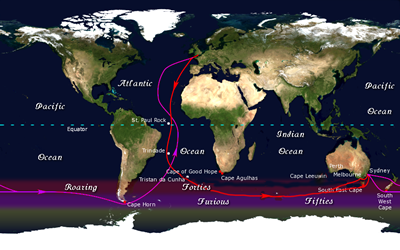 Conclusion Tune, traditional. Lyrics traditional except for 2 phrases by John Leebrick in 1957.
Its tune and structure is derived from
the old Captain Kidd song series. ("My
Name is Captain Kidd," "My Name is Samuel Small," "Ye
Jacobites By Name," "What Wondrous Love is This?" etc.)
For example;-
|
| My name is Captain Kidd as I sailed as I sailed My name is Captain Kidd as I sailed My name is Captain Kidd and God's laws I did forbid And most wickedly I did as I sailed My father taught me well to shun the gates of Hell But against him I rebelled as I sailed He shoved a bible in my hand but I left it in the sand As I pulled away from land as I sailed |
It is very easy to write biographical songs using this structure and tune.
Decades ago I very quickly wrote half a dozen verses,
For shooting Harvey Crewe I was blamed,
Lies about me they did tell, and I spent 9 years in hell,
I was framed, I was blamed, I was maimed.
My wife came running down to the milking shed, milking shed
"Have you heard the news about Jeanette and Harvey Crewe" she said.
“There's bloodstains all around, and Len Demler says he found
His wee granddaughter crying in her bed."…..etc
When I first made a webpage of Davy Lowston in 2002 on the NZFS website (NZFS Archive 2002) I wrote that
The lyrics probably originated on the Sydney waterfront after Loweriston sued the owners of the 'Active' for abandoning his group.However, we now know that Leebrick had fabricated his yarns about where he obtained other songs he sent to Colquhoun, so we need to check whether this this was more likely to have been penned in Sydney or on a sailing ship in about 1814, or in Leebrick’s home in 1957. (or in Colquhoun’s in the 1960s?)
Sydney newspapers regularly published topical poems, and sailors’ compositions were often written down in ship’s logbooks. A return of Loweriston and his crew, and the subsequent court case would have caused a sensation. But no such contemporary printed or written copies have been found.
And
a
contemporary composition would have got the facts
right. They left Sydney harbour in 1809 but the
Leebrick lyrics published by Bailey and Roth in
1967 say that ”Twas
in
1810 we set sail.”
Also the song misses out some details about the
stranded men's boat-building efforts and wrongly
infers that some of them died.
Leebrick
died
soon after he sent his document to Colquhoun, and
none of Colquhoun’s collection of documents have
been made accessible to others.
Conclusion
Tune, traditional. Lyrics by John Leebrick 1957.
(and Neil Colqhoun 1960s?)
4. Blood Red Roses
This
song
had evolved from the words of a courting
dance of young Caribbean couples.
|
Annie,
Annie, coming
down with a bunch of roses, coming down You walk in style coming down With a bunch of roses, coming down Lift up you' clotheses, comin' down Right up to you' noses, comin' down Comin' down with you' bunch o'roses. |
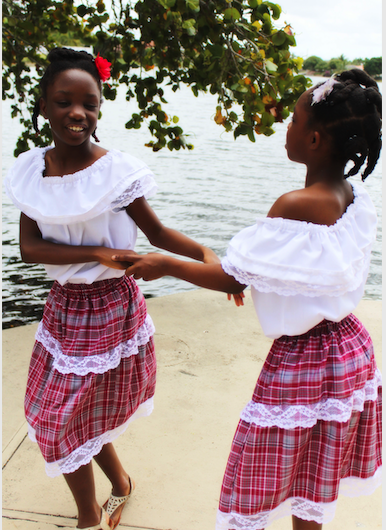 |
By
the 1870s, Caribbean
sailors on trans-Atlantic clipper ships were
singing two halyard
shanties
Ho, Molly come down,
Come down with your pretty posey,
Come
down with your cheeks so rosy,
and
also
Oh,
you pinks an’ poses,
Come down,
you
bunch of ro—ses, COME down,
Oh, what do yer s’pose we had
for supper?
Come down,
you
bunch of ro—ses, COME down,
Black-eyed beans and bread
and butter.
Come down, you
bunch of ro—ses, COME down,
and
in the 1950s Burl Ives’ version
had added a ‘red
red’
variation to the response.
Come down you bunch of roses, come down
A lovely song I'll sing to thee
Oh, you pinks and posies
Come down, you red, red roses, come down
A whale is bigger than a mouse. Come down...bunch..
A sailor's lower than a louse. Come down...red red….
The captain's covered o'er with fur. Come down...bunch...
Has grown a tail like Lucifer Come down...red red….
Blood Red Roses only goes back as far as 1954 when A.L. Lloyd invented it to help build up an atmosphere of grim foreboding as the peg-legged Captain Ahab left port in the otherwise authentically filmed Hollywood movie, Moby Dick, released in 1956.
It’s flamin’ drafty ’round Cape Horn,
Go down, you blood red roses, go down!
Oh, you pinks and posies,
Go down, you blood red roses, go down!
Leebrick took these two 1950s versions and concocted a sealers’ version.
A bull seal he is bigger than a mouse
But a sealer's lot is lower than a louse,
And now we're all covered over with fur,
Come down you blood red roses, come down,
We've grown us tails like Lucifer,
Oh you pinks and posies,
Come down you blood red roses, come down.
Conclusion
5. Shore Cry
I'm very, very well, I'm glad to tell, I fear no judge nor jailer.I'm very very well, I'm glad to tell, so heed these lines ‘m’ whaler.
Oh, what delight on a stormy night to sit beside a burning log.
A'swappin' tales of wondrous whales, and drink a glass of grog.
I'm very, very well, I'm pleased to tell, since landing at Cypress Bay.
I'm very, very well, I'm pleased to tell, but it's here I'm bound to stay.
The
opening line is taken from this 1780s Dublin execution
ballad.
The
Night Before Larry Was Stretched. So these
verses were probably composed by an Irishman.
Then raising a little his head,
To get a
sweet drop of the bottle,
“I’m very, very well,”
says he,
I’m glad
for to
tell ye,
me
jewel;
I
fear neither judge nor jailer,
Cypress Bay is in North Carolina, where shore
whaling began in the 18th
century.
However there is no mention of this song in any US
American documents online. And anybody comfortably settled
on the Carolina coast would be unlikely to join a whaling
voyage to the other side of the world.
Shore whaling did not start
in NZ until 1827, in Tory Channel, at Tawhite Bay. Many
of the whalers were Maori.
Conclusion
A puzzle. It has a lot of repetition, so it is possibly
a short piece composed by Leebrick from scrap phrases,
and extended by Colquhoun.
.
6. Whaling Off Greenland
On March the seventeenth day,
That we hoist our colours to the top of the tree
And for Greenland bore away, brave boys,
For Greenland bore away
. . . . . .
Well, the harpoon struck, and down went the whale
With a flourish of his tail.
And by chance we lost two men overboard.
No more Greenland for you, brave boys,
And we never caught that whale.
. . . . . .
O that Greenland is a dreadful place,
No longer can we stay.
Now the cold winds blow and the whales do go
And it’s seldom ever day, brave boys,
It’s seldom ever day. (Mainly Norfolk)
Conclusion
Not associated with whaling in New Zealand.
7. Soon May the Wellerman Come
This gem of a song was first heard in 1969 on the second episode of a seven-part NZBC series "Songs of a Young Country" a folk ballad story of a young New Zealand. Neil Colquhoun and Tommy Wood were involved in its development.
(a) Learnt from F. R. Woods?
Colquhoun said that he collected the song (words and tune) from a certain F. R. Woods. There is a Francis Reaston Woods, who was born in 1889, worked at Rotomanu, Westland, in 1917, was manufacturing dolls prams in Chch in 1923, owned a motor car in 1928, and who died in Auckland in 1959. But mysteriously, Colquhoun did not include such a good song in the 1967 1st edition of his cyclostyled book New Zealand Folk Songs.
(b) ... or found in in a book on NZ sailors?
Tommy Wood was singing it in Auckland folk clubs in the 1960s and Mike Harding later spoke to him about it. He told Mike...
"I came across the poem in a book on NZ sailors. Unfortunately I have not got the book anymore. All I can remember was stories connected to whaling, exploring NZ and immigration ships, containing personal letters of life on board these ships, including poems... black and white sketches of ships, sailors etc. The Wellerman was an actual poem in the book but not quite in rhyme so I had to adjust some of the words."
(c) The Words of the first five verses.

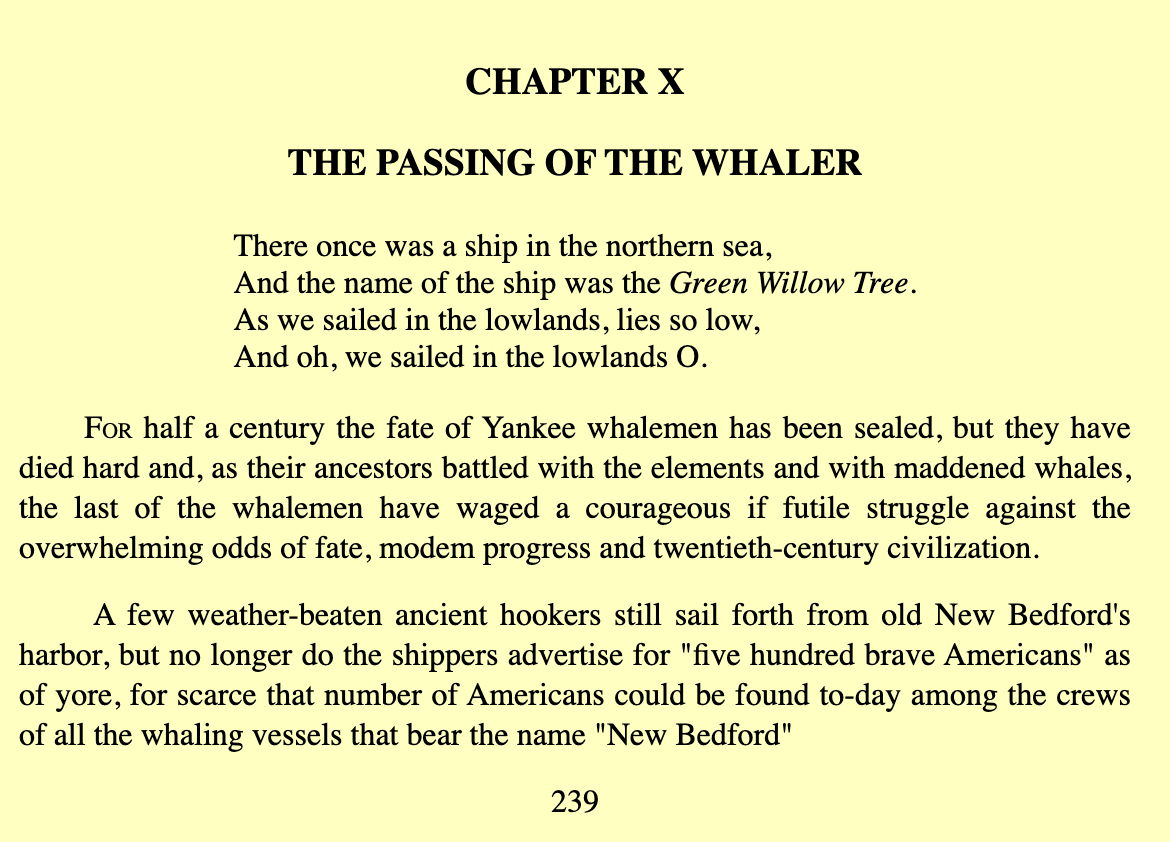
And it is called The Sweet Trinity,
That will go take this false gallaly,
And to redeem The Sweet Trinity? Sailing in the Low-lands . . .
Eck iddle du, and the Lowlands low
And she was called The Goulden Vanitie.
As she sailed to the Lowlands low
She had not sailed a league, a league but only three, Eck, etc.
When she came up with a French gallee. As she sailed etc.
‘I have a ship in the North Countrie,
And she goes by the name of the The Golden Vanity;
I’m afraid she will be taken by some Turkish gallee,
As she sails on the Low Lands Low.’ (Sacred Texts)
And this Appalachian variant was presumably sung by Yankee whalers.
and the name of the ship was the 'Green Willow Tree'
And we sailed in the lowlands, lies so low
We sailed in the lowland O
She wasn't on the sea more than a week or three
When she was overtaken by the Turkish Revillie
And we sailed in the lowlands, lies so low
We sailed in the lowland O
"Of all amusements or recreations, other than shore-leave, the whalers looked forward with the greatest anticipation to visit another ship and whenever two vessels met at sea. The forecastles and cabins rang with laughter, the decks resounded to the shuffle and patter of dancing feet and lusty lungs roared forth the whalemen's songs. Many of these songs of the whalemen were very descriptive of their lives, their experiences and their hardships. . ."
Many
whaling ships were sunk and hundreds of
whaleboats were smashed to smithereens by whales. Mocha
Dick was an white bull sperm whale, "of
prodigious size and strength and white that was
first attacked by whale boats sometime before 1810
near Mocha Island off the coast of Chile. His
unusual white appearance,
and ability to survive about a hundred whalers'
attacks quickly made him famous.
He was quite docile, but once attacked he
retaliated with ferocity and cunning, sinking 20
whaling ships and dozens of whaleboats. He would
sound and then breach so aggressively that his
entire body would sometimes come completely out of
the water. The case of the
Nantucket whaler Essex is often quoted.
(The Nautical Magazine 1908)
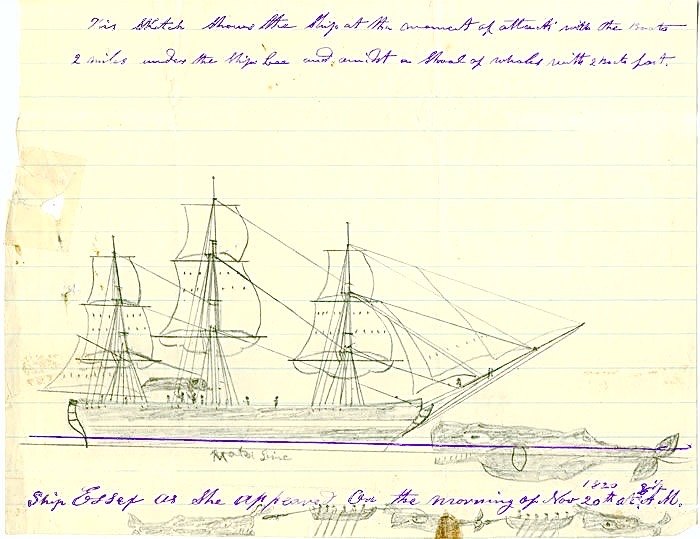
The winds blew up, her bow dipped down,
O blow, my bully boys, blow; ho, ho,
O blow, my bully boys, blow;
When down on her a white whale bore.
The captain called all hands and swore
He'd take that whale in tow: ho, ho,
He'd take that whale in tow.
The whale's tail came up and caught her.
All hands to the side, harpooned and fought her
When he dived down below ho, ho.
No line was cut, no whale was freed;
The Captain's mind was not of greed,
But he belonged to the whaleman's creed;
When she took the ship in tow ho, ho.
He took the ship in tow.
For forty days, or even more,
The line went slack, then tight once more.
All boats were lost (there wasWoodsWFrancis only four)
But still the whale did go, ho, ho,
But still the whale did go
(d) The words of the last verse
The line's not cut and the whale's not gone.
The Wellers' man makes his regular call
To encourage the Captain, crew, and all.
This is a nonsense verse because in the days before telegraph operators on ships, a provisioning ship could not regularly find a whaler at any random place in 20,000 square miles of open seas, and cases of stores cannot be exchanged between ships on the rough seas of the Southern Ocean, with one ship attached to an unstoppable whale.
The Wellers' ships only exchanged stores and whale-oil in sheltered New Zealand harbours.
(e) The words of the chorus

In the middle of a field stands a lightning tree
It's limbs all torn from the day it was born
For the tree was born in a thunderstorm.
 ee
eeIt's never too late for you and me
Grow, grow, the lightning tree
Never give in too easily.
However we now know that Tommy Wood or Neil Colquhoun recorded it for an NZBC program in 1969, and that this program was probably played by the BBC in England in 1970, where songwriter "Francis Essex" (Stephen Francis) changed the tune slightly to make it more upbeat, and then claimed composer's rights for the tune.
In 1971, we can presume Neil Colquhoun heard "The Lightning Tree" on TV in NZ, and used the more upbeat tune for his 1972 version of Wellerman.
Conclusion
1630s - Sir Walter Raleigh "Sailing in the Lowlands on the Sweet
Trinity" is attacked by a "false gallaly," or Barbary coast pirate
ship. Then the Sweet Trinity becomes Sweet Kermadee, then the
Golden Vanity.
On a USA whaling ship, the False gallaly/French galley/Turkish
revilee attacking the ship becomes Mocha Dick, a 'white/right
whale.'
1967 - Tommy Wood either finds some 'right whale' lyrics in an
1968 - Neil Colquhoum composes a Wellerman last verse and
chorus for Wood's 'right whale' verses.
1969 - Wellerman is recorded for the NZBC, and the program
1971 - "The Lightning Tree," a bouncy song of survival
after a mortal attack, and using the tunes for both the verses and
a probably fictitious Frank R. Woods.
APPENDIX 1.
APPENDIX 1.
1. The Bold and Saucy China,
by
James Ashby, circa 1839-42
From New Bedford is a going
To where there is many a gale of wind my boys
And whale fish they are blowing. x 2
It is when we do get out my boys
Oh its SSE we'll steer
Till we make the Island of St Pauls*
And whale fish they appear, x 2
Chorus
Let your hearts never fail
Whilst the bold and saucy China
Is a cruising after whale.
We cruised about this country
For two long months or more
Till we got a thousand barrels boys
Then the season it was o'er. x2
We left this cold and stormy place
In the first quarter of the moon
And reached Otago's cruising ground
Before the first of June. x2
Chorus
We cruised about the ground my boys
For three long months or more
When we got 500 barrels boys
And we could not get any more. x2
But we cruised around the northern ground **
And fill'd her up my boys
Then for New Bedford we were bound
To our hearts' content and joy. x2
Chorus
The American whaling ship China visited Akaroa at least three times in 1839-42, the Chathams in 1842,s and was one of the few early American whaling ships to visit Wellington, which was not really a whaling port. China's stay in Wellington was from 2 July till 9 September, in 1839. The composer of this song, James Ashby, was one of the China's crew.
Thanks to the Public Library, New Bedford, Massachusetts.
* The île Saint-Paul is 5300 km south-east of South Africa.
** The 'northern' whaling ground was the Cook Strait region.
The China song is a modified version of this 1812 Scottish song.
The Bonny Ship the Diamond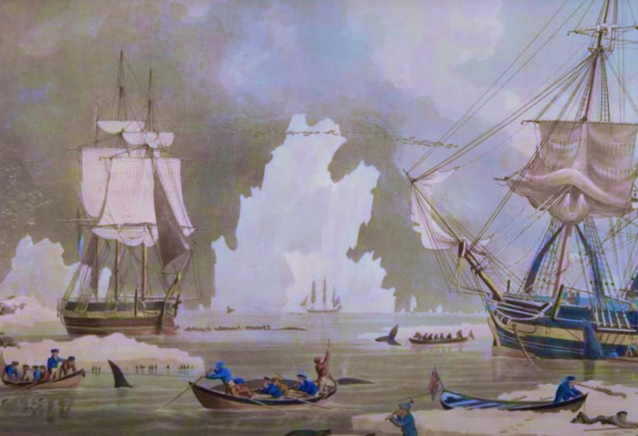 The Diamond is
a ship, my lads,
for the Davis Strait she’s bound, And the quay it is all garnished with bonny lasses ’round. Captain Thompson gives the order to sail the ocean wide, Where the sun it never sets, my lads, no darkness dims the sky. Chorus
And it’s cheer up my lads, let your hearts never fail, For the bonny ship, the Diamond, goes a-fishing for the whale. Along the quays of Peterhead, the lasses stand around, Their shawls all pulled about them and the salt tears running down. Now don’t you weep, my bonny lass, though you be left behind, For the rose will bloom on Greenland’s ice before we change our mind. Chorus
Here’s health to the Resolution, likewise the Eliza Swan, Here’s a health to the Battler of Montrose and the Diamond, ship of fame. We wear the trousers of the white, the jackets of the blue, When we return to Peterhead, we’ll have sweethearts anoo. Chorus Oh,
it will be bright both day and night
when the whaling lads come home, In a ship that’s full of oil, my boys, and money to our name. We’ll make the cradles all to rock and the blankets for to tear, And every lass in Peterhead sing, “Hushabye, my dear.” Chorus |
2. Saturday Night at Sea
George
E. Mills, 1843
And messmates bold and free
And ever welcomes with delight
Saturday night at sea.
Saturday night at sea
Saturday night at sea
One hour each week we'll snatch from care
As through the world we roam
And think of dear ones far away
And all the joys of home
Saturday night at sea
Let the winds blow high on board
Saturday night at sea
We'll think of those bright beings who
Bedeck with joy our lives.
And raise to heaven a prayer to bless
Our sweethearts and our wives
Saturday night at sea
In storms and calms through life we'll sing
Saturday night at sea.
3. So Slowly She Dies
George E Mills 1854
Broad o'er the water its glistening beam throws
Hark! from our masthead the joyful sound ringing
""Hard on our lee beam; A Whale, There She Blows""
Call up the sleepers! Then larboard and starboard men
Mainyard Aback! Man the boats; lower away
Hard on our sea beam! see the white water gleam
Wreathing her form in a garland of spray.
Now the Leviathan in vastness is lying
A making the seas a voluptuous bed
Whilst wheeling o'er her the sea birds are flying
A watching the billows that break o'er her head.
Broad high and close too, there she goes flukes in air
So stately and slowly she sank in the main
Peak all you oars awhile, rest from your weary toil
Waiting and watching her rising again.
Row hearties, pull if you love your ambition
Spring to your thwarts, let the reeking sweat flow
Now if you've got blood let it have demonstration
Bend to your oars and give way all you know.
See every boat advance as gay as to a dance
A gliding like shadows across the blue sea
Stand up and give her some, send both your irons hence
Stern all trim the boat, see the line all free.
Surrounded with foes yet with strength undiminished
So wildly she lashes the sea in her ire
A lance in her life and the struggle is finished
So slowly she sinks with the chimney on fire.
Loud rings the joyful sound from every seaman strong
Watching the sea in its turbulent roar
Look from her spout holes the red signals flying
So slowly she dies and the struggle is o'er.
By George E. Mills, fourth mate on the whaling ship Java of New Bedford, 4 July 1854. The Java visited New Zealand during its 1854-6 and 1864-7 voyages.
Thanks to the Kendall Whaling Museum. These lines create most emotional impact by being recited without any musical accompaniment.
APPENDIX 2.
A Real Shore-whaler's Memories
"I came to Otago in a brig named the Micmac, and landed at Otago on the 17th March, 1836 (St. Patrick's Day). The very day after we landed, they killed a couple of fair sized whales right up in the harbour. They were the first whales I ever saw killed. The boats were not away more than twenty minutes before they had them both, and they were killed in a twinkling...." More
Researched and added to NZFS website by John Archer in April 2025, corrected and added to in October 2025.
Free-Counters.org
